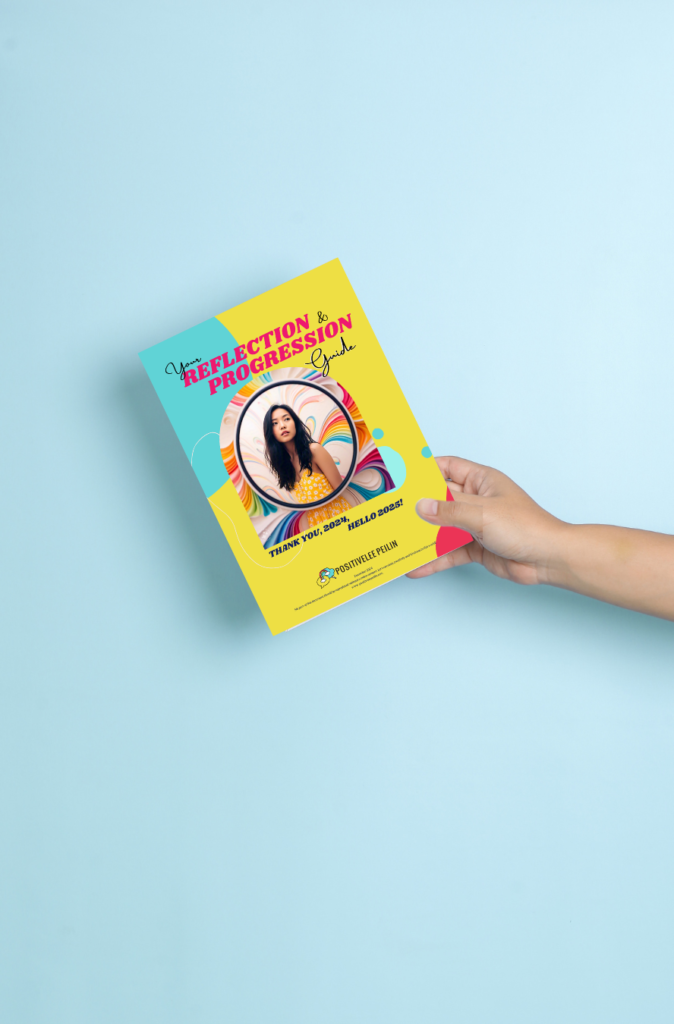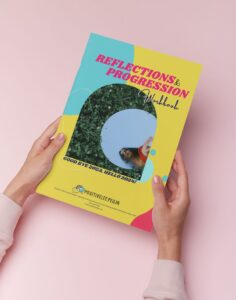"Without reflection , we go blindly on our way." - Margaret J. Wheatley
I was eating my fish noodle soup for lunch when it struck me – each Enneagram type has its own unique lens in the reflection process—along with its stumbling blocks which hinder deeper reflection.
Reflections – I don’t need to tell you that this is a critical aspect of growth. I value this so much that I’ve developed a Reflections 2024 & Progression 2025 Guide for you, which you can download here.
Reflect Knowing Your Resistance
Year-end reflection isn’t just about listing achievements or setting new goals (although yes, eating healthier is on my list yet again this year).
It’s an opportunity to deepen your self-awareness and identify patterns that might be helping or hindering growth. Understanding your Enneagram type can make this process more focused and meaningful.
No one size fits all, when reflecting. Look out for these, based on your Enneagram type:

Type 1s: Your natural inclination towards improvement serves you well in reflection, but beware of being overly critical. You might focus exclusively on what went “wrong” or needs “fixing.” Challenge yourself to acknowledge and celebrate what went well.
Consider keeping a “wins journal” throughout the year to balance your natural tendency to spot imperfections. Pay special attention to moments when you showed yourself grace and compassion—these are often more significant victories than your outward achievements.
Growth isn’t always about fixing flaws. Sometimes it’s about accepting your wonderfully human nature.
Type 2s: While reflecting, you might naturally focus on relationships and how you’ve supported others. Your blind spot could be overlooking your own needs and achievements that aren’t related to helping others.
Take time to consider: What did you do purely for yourself this year? What boundaries did you maintain successfully? Notice when giving felt genuinely energising versus depleting—this distinction offers valuable insights into your authentic desires versus your conditioned responses.
Consider tracking moments when you allowed others to support you, as these often mark significant personal growth.


Type 3s: You excel at tracking concrete accomplishments, but might miss the subtle growth in areas like emotional intelligence or relationship depth.
Challenge yourself to reflect beyond the Linked-In-worthy achievements. What vulnerable conversations did you have? When did you choose authenticity over success? Pay attention to moments when you felt truly seen for who you are, not what you accomplished.
Your most significant growth might have happened in the spaces between achievements—when you chose to be rather than do.
Type 4s: Your natural introspective abilities serve you well in reflection, but you might over-emphasise emotional experiences or missed opportunities. Balance your reflection by acknowledging ordinary successes and everyday joy.
Consider: What simple pleasures brought you contentment this year? Look for patterns in your emotional landscape—did you notice times when embracing the ordinary actually led to feeling more special and authentic?
Your growth might be most evident in moments when you chose connection over uniqueness, or when you found depth in simplicity.


Type 5s: Your analytical skills help you assess the year objectively, but you might focus too much on what you learned or observed rather than how you engaged with life.
Reflect on: When did you step out of your comfort zone to participate fully? What experiences enriched you beyond intellectual growth? Consider documenting moments when you chose to share your resources (time, knowledge, energy) freely instead of conserving them.
Notice how physical and emotional engagement, not just mental understanding, contributed to your growth this year.
Type 6s: You’re skilled at identifying potential problems and preparing for challenges, but this might lead to undervaluing your successes and growth.
In your reflection, notice: When did your preparation pay off? When did things work out despite your worries? What evidence of your capability did this year provide? Pay particular attention to moments when you trusted your inner guidance instead of seeking external reassurance.
Your growth might be most evident in times when you embraced uncertainty with courage rather than trying to eliminate it.


Type 7s: Your positive outlook helps you appreciate the year’s adventures, but you might gloss over challenging experiences that hold valuable lessons.
Take time to sit with the fuller picture: What difficult situations helped you grow? What patterns might need attention rather than reframing?
Consider how staying with discomfort—rather than planning the next excitement—has contributed to your personal growth. Look for moments when depth and presence brought more satisfaction than variety and novelty.
Type 8s: You’re great at assessing power dynamics and impact, but might overlook subtle influences and quiet victories.
Consider: When did gentleness serve you better than strength? What vulnerable moments led to deeper connections? How did others contribute to your success?
Pay attention to situations where allowing yourself to be influenced or supported actually increased your impact rather than diminished it. Your most profound growth might have occurred in moments when you chose to reveal your tender side rather than your strong one.


Type 9s: Your inclusive perspective helps you see multiple viewpoints, but you might minimise your own impact and agency.
Focus your reflection on: What did YOU want and actively pursue this year? When did taking a strong stance serve you well? What impact did your actions have on others? Look for patterns where speaking your truth led to deeper harmony rather than conflict.
Consider tracking moments when you chose to create positive tension rather than avoid it—these often mark significant growth points in your journey to self-actualisation.
Making Your Reflection Practice More Effective
- Schedule dedicated reflection time – don’t try to squeeze it between holiday activities
- Create a comfortable, quiet environment for deep thinking
- Download this Reflections guide which prompts you on areas to reflect
- Consider working with a coach to identify blind spots and patterns
- Balance appreciation with areas for growth
Understanding your Enneagram type’s reflection patterns doesn’t just help with reviewing the past year—it provides valuable insights for setting intentions and goals for 2025. Your type’s core motivations, fears and defence mechanisms influence how you approach future planning, just as they affect how you process the past.
Coaching = Supercharged Reflecting
As we wrap up 2024, remember that meaningful reflection isn’t about harsh judgment or complete transformation. It’s about understanding ourselves better and making conscious choices about our growth journey.
I encourage you to use this Reflections 2024 & Progression 2025 Guide as a starting point.
Your Enneagram type offers valuable insights into this process, but shouldn’t limit your exploration. Working with a certified coach who understands your Enneagram tendencies deepens your insights and can support you in making targeted development plans for the year ahead.
Remember, the goal isn’t to become a different person, but to become a more conscious and integrated version of yourself. Here’s to meaningful reflection and continued growth in 2025. I’m rooting for you!
If you’re interested in exploring how your Enneagram type influences your growth journey, or if you’d like support in navigating challenging transitions, professional coaching can provide valuable guidance. Together, we can work on deeper reflections and coming up with an action plan.
To take your first step, choose from 3 coaching options here. Email me at positiveleepeilin@gmail.com or whatsapp +65 8288 5457 to book for more information.




